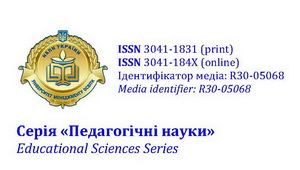The essence and issues of the concept of «Іnstruction»
Анотація
Ключові слова
Повний текст:
PDF (English)Посилання
REFERENCES / СПИСОК ВИКОРИСТАНИХ ДЖЕРЕЛ
A. Abbasov, «Pedaqoji təcrübə gələcək müəllimlərin peşəyə hazırlanmasının mühüm vasitəsi kimi», ARTİ-nin Elmi əsərləri, № 4, s. 8–12, 2014. [Online]. Available: https://arti.edu.az/wp-content/uploads/2024/01/Elmi-eserler_4_2014.pdf Application date: December 15, 2024.
Ə. Abbasov, Kurikulum bələdçisi: İzahlar və tətbiqlər. Bakı, Azərbaycan : Elm-Təhsil, 2019.
Ə. Ağayev, Pedaqogika. Bakı, Azərbaycan : Nasir, 2007.
İ. Cavadov, Ümumtəhsil məktəblərində monitorinq və qiymətləndirmə. Bakı, Azərbaycan : Mütərcim, 2002.
M. İlyasov, Müəllimin peşəkarlığı və pedaqoji səriştəliliyin müasir problemləri. Bakı, Azərbaycan, 2018.
N. Kazımov, «Pedaqoji ustalığın problemləri», in Ali məktəblər üçün vəsait. Bakı, Azərbaycan : Çaşıoğlu, 2009, s. 256.
A. Mehrabov, «Müasir dərs: onun təşkilinə və gedişinə qoyulan tələblər», Kurikulum, № 3, s. 5–10, 2013. [Online]. Available: https://www.calameo.com/books/000215145e8f6668c7d33 Application date: December 15, 2024.
Ə. Paşayev, Pedaqogika. Yeni kurs. Bakı, Azərbaycan : Çaşıoğlu, 2010.
I. A. Zimnyaya, Pedagogical Psychology. Moscow, Russia : Logos Publishing Corporation, 2000. (російською).
J. Raven, Pedagogical testing: problems, misconceptions, prospects. Moscow, Russia: Cogito-Center, 1999. (російською).
A. Crawford, S. R. Mathews, J. G. Makinster, E. W. Saul, Teaching and learning strategies for the thinking classroom. New York, USA : The International Debate Education Association, 2005. [Online]. Available: https://www.scirp.org/reference/referencespapers?referenceid=1457967 Application date: December 15, 2024.
G. R. Morrison, S. M. Ross, H. K. Kalman, J. E. Kemp, Designing Effective Instruction. John Wiley & Sons, 2012. [Online]. Available: https://books.google.com.ua/books/about/Designing_Effective_Instruction.html?id=ixJwDwAAQBAJ&redir_esc=y Application date: December 15, 2024.
A. Franko, P. Sahlberg «Finnish lessons: what can the world learn from educational change in Finland?», in CEPS Journal 1. New York, USA : Teachers College Press, 2011, vol. 3, p. 167–170. https://doi.org/10.25656/01:11098 [Online]. Available: https://www.pedocs.de/volltexte/2015/11098/pdf/CEPSJ_2011_3_Franko_Rezension_Sahlberg_Finnish_lessons_what_can.pdf Application date: December 15, 2024.
P. Black and D. Wiliam, «Developing the theory of formative assessment», Educational Assessment, Evaluation and Accountability, vol. 21, is. 1, p. 5–31, 2009. https://doi.org/10.1007/s11092-008-9068-5 [Online]. Available: https://link.springer.com/journal/11092/volumes-and-issues/21-1; https://www.researchgate.net/publication/225590759_Developing_the_theory_of_formative_assessment#full-text Application date: December 15, 2024.
TRANSLATED AND TRANSLITERATED / ПЕРЕКЛАД, ТРАНСЛІТЕРАЦІЯ
A. Abbasov, «Pedagogical practice as an important means of preparing future teachers for the profession», Scientific works of ARTI, № 4, s. 8–12, 2014. [Online]. Available: https://arti.edu.az/wp-content/uploads/2024/01/Elmi-eserler_4_2014.pdf Application date: December 15, 2024. (in Azerbaijani).
А. Abbasov, Curriculum guide: Explanations and applications. Baku, Azerbaijan : Elm-Təhsil, 2019. (in Azerbaijani).
А. Aghayev, Pedaqogika. Baku, Azerbaijan : Nasir, 2007. (in Azerbaijani).
І. Javadov, Monitoring and evaluation in secondary schools. Baku, Azerbaijan : Mutarcim, 2002. (in Azerbaijani).
M. Ilyasov, Modern problems of teacher professionalism and pedagogical competence. Baku, Azerbaijan, 2018. (in Azerbaijani).
N. Kazimov, «Problems of pedagogical mastery», in Manual for higher schools. Baku, Azerbaijan : Chasioglu, 2009, s. 256. (in Azerbaijani).
A. Mehrabov, «Modern lesson: requirements for its organization and course», Curriculum, № 3, s. 5–10, 2013. [Online]. Available: https://www.calameo.com/books/000215145e8f6668c7d33 Application date: December 15, 2024. (in Azerbaijani).
А. Pashayev, Pedagogy. New course. Baku, Azerbaijan : Chasioglu, 2010. (in Azerbaijani).
I. A. Zimnyaya, Pedagogicheskaya psikhologiya. Moskva, Rossiya : Izdatelskaya korporatsiya «Logos», 2000. (in Russian).
Dzh. Raven, Pedagogicheskoe testirovanie: problemi, zabluzhdeniya, perspektivi. Moskva, Rossiya : Kogito-Tsentr, 1999. (in Russian).
A. Crawford, S. R. Mathews, J. G. Makinster, E. W. Saul, Teaching and learning strategies for the thinking classroom. New York, USA : The International Debate Education Association, 2005. [Online]. Available: https://www.scirp.org/reference/referencespapers?referenceid=1457967 Application date: December 15, 2024. (in English).
G. R. Morrison, S. M. Ross, H. K. Kalman, J. E. Kemp, Designing Effective Instruction. John Wiley & Sons, 2012. [Online]. Available: https://books.google.com.ua/books/about/Designing_Effective_Instruction.html?id=ixJwDwAAQBAJ&redir_esc=y Application date: December 15, 2024. (in English).
A. Franko, P. Sahlberg «Finnish lessons: what can the world learn from educational change in Finland?», in CEPS Journal 1. New York, USA : Teachers College Press, 2011, vol. 3, p. 167–170. https://doi.org/10.25656/01:11098 [Online]. Available: https://www.pedocs.de/volltexte/2015/11098/pdf/CEPSJ_2011_3_Franko_Rezension_Sahlberg_Finnish_lessons_what_can.pdf Application date: December 15, 2024. (in English).
P. Black and D. Wiliam, «Developing the theory of formative assessment», Educational Assessment, Evaluation and Accountability, vol. 21, is. 1, p. 5–31, 2009. https://doi.org/10.1007/s11092-008-9068-5 [Online]. Available: https://link.springer.com/journal/11092/volumes-and-issues/21-1; https://www.researchgate.net/publication/225590759_Developing_the_theory_of_formative_assessment#full-text Application date: December 15, 2024. (in English).
Посилання
- Поки немає зовнішніх посилань.
